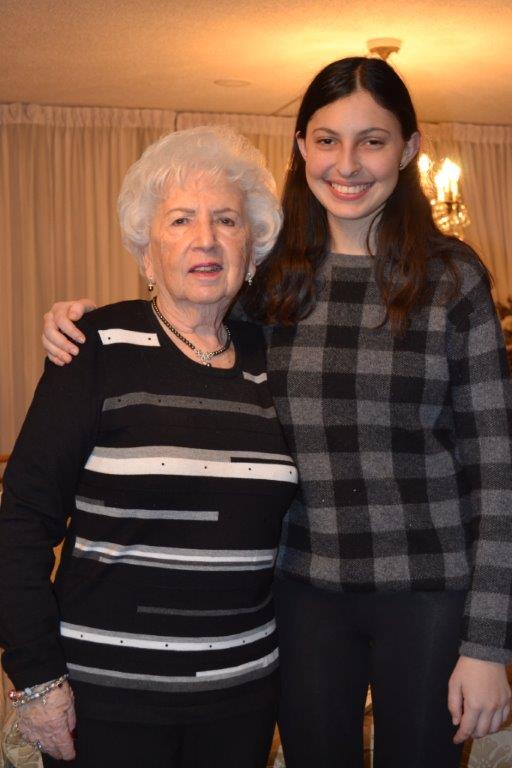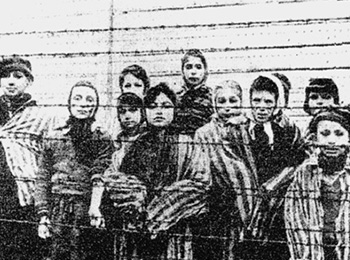TORONTO — My grandmother, Holocaust survivor Miriam Ziegler, is busily preparing for a trip to a place she never thought she would go again.
On Jan. 27, she’s returning to Auschwitz, joining more than 100 fellow survivors for the 70th anniversary of their liberation. She will also be reunited with five of the 13 children who were photographed by a Soviet photographer as the Russian soldiers approached to give them their freedom.
She didn’t even know about the existence of this picture until a visit to Israel in 1981, where she saw the photo of herself on the walls of Yad Vashem. She likens the experience to “seeing a ghost.”
Miriam Ziegler, born in Radom, Poland, experienced her first glimpse of war through four-year-old eyes.
“I left my hometown on horse and buggy with my mother when the war broke out. We saw the Nazis shoot our driver. That was my first of many escapes from death during the war.”
We sit in her comfortable Thornhill condo discussing the traumatic events of the war. She seems a bit tired after having been interviewed by several news sources earlier in the week. She is not used to all the attention.
She shows me an old photo album, one of the only relics from her youth. She clutches these photographs, pointing out the many family members who were killed. “I didn’t have a childhood,” she explains.

Miriam Ziegler with her granddaughter Hannah
Miriam spent her early years in Radom, the only child of store-owners Hershel and Rose Friedman. When Nazi soldiers marched into her town, she fled to her grandparents’ village of Ostrowiec. She was hidden by a farmer, and then by a Polish woman, and survived a mass shooting in an attic before being smuggled back into the ghetto.
By the summer of 1944, Miriam and her family were transported to Auschwitz. She was one of the few children who survived the horrors of the death camp. She witnessed death marches and other atrocities about which she dared not utter a word. She was separated from her family and received a tattoo that reduced her to a number. “A16891. That was my name in Auschwitz,” she laments. She points to her arm, a familiar pose.
When she was finally liberated on Jan. 27, 1945, she became part of what would become an iconic picture. She is seen standing with other children behind a barbed wire fence, pointing to her number. While all the children are standing solemnly and stiff, Miriam pointed to her tattoo instinctively. “I was so used to responding to my number,” she explains.
Freedom should have tasted sweet, but Miriam felt nothing but dread. “I was standing there, numb, because I didn’t know where my family was. I didn’t know where I was going to end up.”
She was relocated to an orphanage in Krakow before reuniting with her mother and grandmother. Her father, she eventually was told, died in a death march.
Miriam moved to Canada in 1948, where she later met and married Roman Ziegler, also a Holocaust survivor. They now have three children, and four grandchildren.
For a long time, my grandmother has been reluctant to talk about the Holocaust and the toll it’s taken on her. When she was asked by the World Jewish Congress and USC Shoah Foundation to attend the 70th anniversary, she was hesitant to say yes. After a previous visit to Auschwitz in 1981, she vowed to never go back.
“It brought back horrible memories,” she says. “They showed me a movie [of the liberation], and seeing myself being taken out of the gates to the orphanage…” She pauses for a few seconds to collect her thoughts. “I feel it is my duty to go back. I know there are not many survivors left to speak, and I need to speak on behalf of the millions who were killed, who had no voice. And I need to tell my story to the future generations so they will never forget.”
My grandmother places her old photo album back on the table, surrounded by pictures of our family.
She will be joined by my aunt, Adrienne, on this trip. They will also be visiting Ostrowiec, where she hopes to find her grandparent’s store and old house.
“Hopefully this will give me closure… I get more scared every day as the trip approaches, but I have to face it. I have to be there to say ‘I am here, I am alive, and I have my family.’”
There is no doubt that this will be an emotional journey, but my grandmother has faced unimaginable challenges with strength and courage since she was four years old, and will do the same at age 79. This time the whole world will hear her voice. n
Hannah Ziegler is in Grade 12 at the Anne and Max Tanenbaum Community Hebrew Academy of Toronto.
